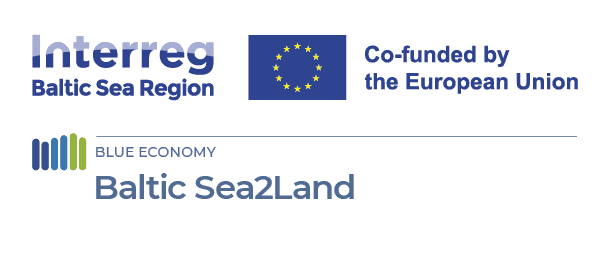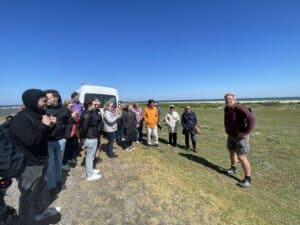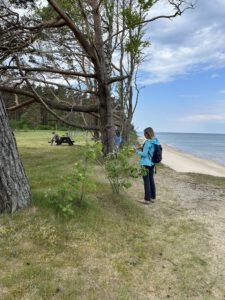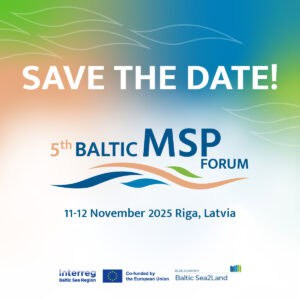
A look back at 2024
20 December 2024
Most people associate the sea and the seaside with summertime. The Baltic Sea2Land project team is one of the very privileged groups that get to observe, plan, protect and care for our Baltic Sea all year round! 2024 has been another important year where we have seen the urgency of climate change, renewable energy adoption, and ecosystem service safeguarding while enabling blue industries.
To us, 2024 was a year of:
Irreplaceable teamwork

In 2024 all partners came together in Hamburg, Germany for a three-day face-to-face meeting and study visit to the Fehmarn island. We rarely get to meet like this, so we used the opportunity to discuss the state and needed improvements to the Sea2Land Navigator, already started and planned activities associated with the update of the Common Recommendations for Spatial Planning of the Coastal Zone in the Baltic Sea Region and future materials for planners to learn about the Sea2Land Navigator and how to use it. We also got to see the power of place ownership on the Fehmarn island – an inspirational example of a local community driving the protection of a unique coastal ecosystem in the face of blooming tourism.
Making the Sea2Land Navigator platform
We worked hard to materialise all that we had conceptualised in 2023 for the Sea2Land Navigator. From a collection of various maritime and coastal data, we have made the Data Hub, where thematic data can be found by country and topic. From the vast materials available online and our own archives and experiences, we have built the Knowledge Hub – a library full of valuable experiences, novel approaches, methodologies and important maritime and coastal planning documents. From a collection of interesting, interactive and co-creative approaches to planning, we have made an interactive Multi-Level Governance Tool, which asks planners to think beyond the usual procedures and explore the Data Hub and Knowledge Hub.
The new and beautiful Sea2Land Navigator lives here: https://navigator-helcom.hub.arcgis.com/!
3 local level pilots
Colleagues in Germany worked on the energy self-sufficiency roadmap for the Fehmarn island and its community. Meanwhile, the Estonian partners joined forces to focus on deliberating about the coastal land use on the Saaremaa island and access to the coast, they worked towards a general plan for the island. In Poland a road map for establishing “energy citizenship” on the local level was drafted.
5 regional level pilots

In Lithuania our partner Klaipeda Region has reviewed The Klaipėda regional specialisation strategy 2030 and worked to design implementation monitoring indicators and pathways. In Latvia the Kurzeme Planning Region has worked with coastal communities, municipalities and businesses to understand how a regional coastal thematic plan could be drafted to support the national ambitions, balancing development interests and values of nature, culture and local communities. Simultaneously, a coastal landscape assessment was executed by the BEF-Latvia team to support both regional and national Latvian pilots. In Finland three regional pilots raised awareness about the new coastal strategy and its implementation through promoting the blue-green infrastructure of a regional plan, finding suitable areas for renewable energy in the catchment area and promoting migratory fish through MSP.
2 national level pilots
In both Finland and Latvia the national pilots were conducted in close collaboration with the regional level and demonstrated how different levels of planning can supplement, support and complement each other. In Finland the concept of blue-green corridors regionally is being taken as inspiration for a national level blue-green infrastructure network planning. In Latvia an existing Coastal Thematic Plan for the national level and its implementation has been reviewed in close collaboration with cross-sectoral representatives.
Moving toward a great 2025

Work has begun on designing online learning materials to support all planners who would like to utilise the Sea2Land Navigator to support their own work. We have reflected on our good and not-so-great days during the piloting process and capacity-building opportunities taken and still needed and started to shape these insights into a MOOC course and workshops. If your New Year’s resolution is to learn something new about maritime and coastal planning we are happy to join you for the journey!
We started planning our final project conference – the 5th Baltic MSP Forum! Over two organising task force meetings under the guidance of VASAB Secretariat we have outlined our conference programme agreeing on topics each of us will cover. We are happy to say – we will see you on the 11th and 12th of November in Riga, Latvia for the conference!
We wish everyone a beautiful holiday and above all – may your 2025 be filled with many beautiful seascapes, exciting sightings of new birds, jellyfish and algae, as well as sunny days at the coast of the Baltic Sea! To get into the Holiday spirit check out our playlist for a holiday around the Baltic Sea!





